When to Replace Brake Calipers? Signs, Costs & FAQs
-
Kristin Hitchcock
- Last updated:
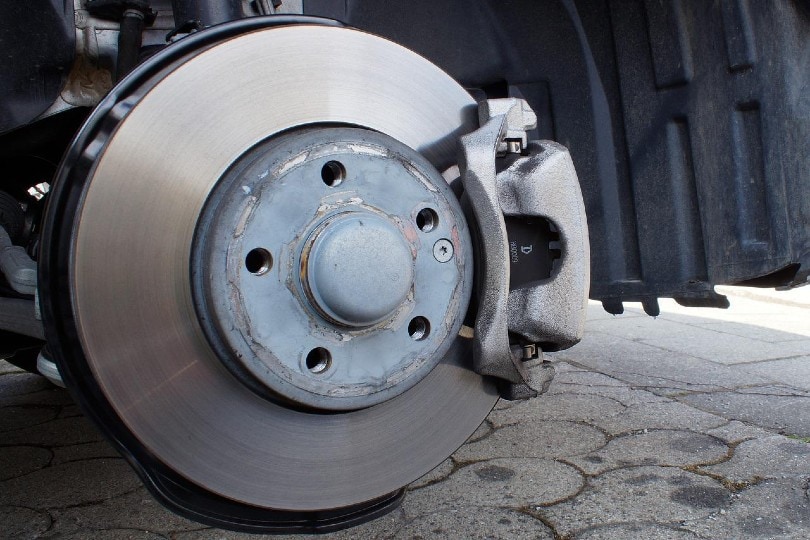
Generally speaking, you’ll need to replace your brake calipers after 7–10 years of service, or after 75,000 miles. Usually, we recommend changing them whenever you meet any of these requirements.
With that said, you may want to have your mechanic look at the calipers whenever they perform other maintenance on your car. Whenever brake calipers get older, the chance of them sticking and leaking goes up considerably.
It’s typically better to replace the calipers whenever they begin to show signs of aging, even if you haven’t met any of the above metrics.
Why Do You Need to Change Your Brake Calipers?
Brake calipers require a rubber seal to work properly. However, like all rubber, this seal will wear and harden over time. Eventually, it will become so hard and unmalleable that it will be unable to work anymore. As you might guess, the harder the seal is, the higher the chance of a leak.
Technically, you can rebuild old calipers with newer parts. However, this process takes a lot of time and increases the odds of a malfunction in the future. Often, it is cheaper to just replace the old calipers with new ones. Plus, new calipers are much safer.
Left unchanged, calipers are likely to leak or stick. Leaking is extremely dangerous and should not be ignored, as it can lead to brake failure. Leaks will eventually occur, as the rubber will become too hard to create a seal. Furthermore, pores and holes can form, which lead to leaks as well.
Therefore, all calipers will need to be changed eventually. It is more of a matter of when they will need to be changed—not if.
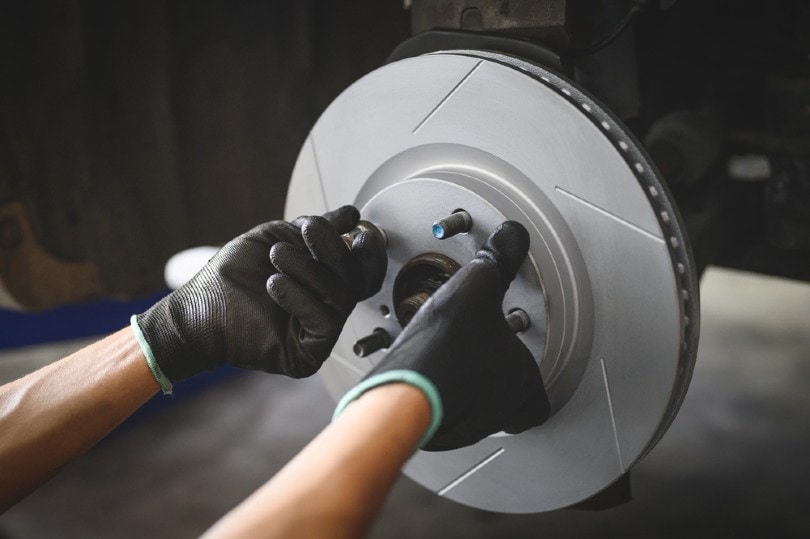
The 5 Signs You Need a Caliper Replacement
Previously, we recommended changing your caliper when you reached 75,000 miles or 10 years of service. However, you may need to replace your calipers sooner depending on the hardening of the rubber and wear. Here are some common signs that your calipers may need to be replaced now.
1. Vehicle Drifts
If your car tends to drift to one side when you’re braking, it could be that one of your calipers is not working correctly. Of course, there are other reasons for this occurrence as well. For instance, your tires may not be correctly balanced.
Either way, the drifting can occur while you’re braking or when you aren’t braking, depending on the exact wear and tear.
2. Unusual Noises
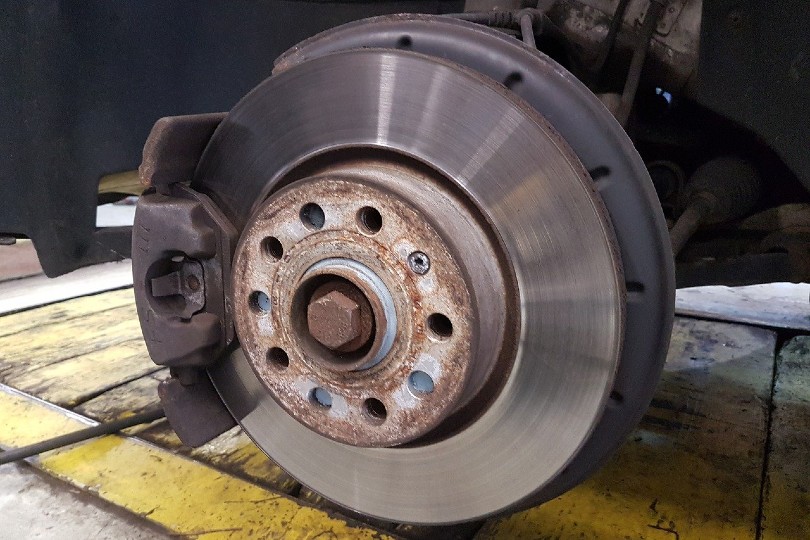
Caliper problems can make several types of noises when you are breaking and driving. For instance, high-pitched squealing while driving. Alternatively, metallic rubbing noises can also occur. If these noises are due to the calipers, they will typically occur at any time.
However, if they specifically occur while braking only, then it is likely the brake pads—not the calipers.
3. Uneven Wear on Brake Pads
Under normal conditions, your brake pads should wear pretty evenly. However, if your caliper needs to be replaced, then this may not always be the case. The caliper may not allow the brake pad to work properly, which can make it wear less than the working brake.
If you notice significant differences in wear, it may be a sign that you need to get your whole caliper replaced.
4. Leaking Brake Fluid
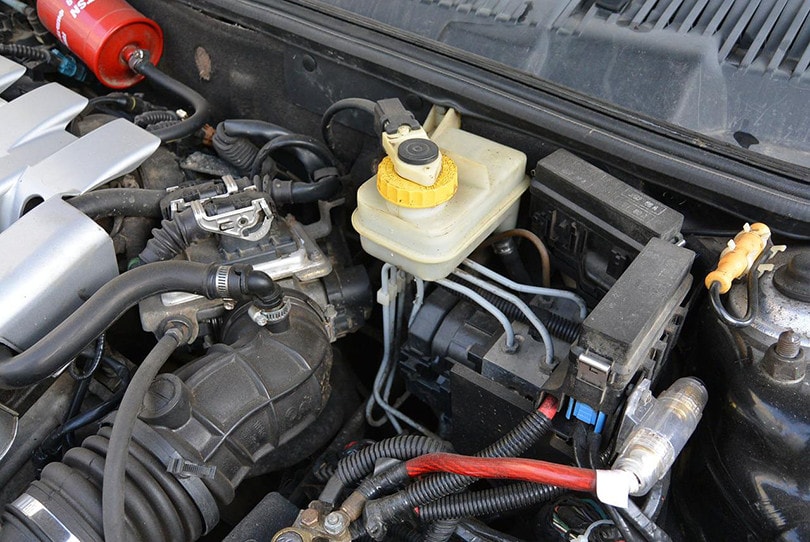
One sure sign that your caliper needs to be replaced is brake fluid leakage. To function, most brakes today rely on hydraulic pressure. However, when there is a problem with the caliper, the fluid that allows the hydraulic power to occur may leak out.
With that said, there are several reasons that leakage may occur. While your caliper is often the first suspect, there could be other damaged parts causing the leakage.
Without the proper amount of fluid, your brakes will not work. Therefore, we don’t recommend driving a car with a brake fluid leak. It simply is not safe.
5. Clunking
There are several parts on a caliper that can go bad—not just the rubber. If the bracket that holds the caliper in place is not working correctly, then it may cause a clunking sound when you’re driving the car. Of course, because the caliper is not being held in place, your breaks will not usually work. This situation is very dangerous and requires serious attention.
We do not recommend that you drive a car making this sound, as the odds of the brakes not working are very high.
Should You Replace Brake Calipers in Pairs?
You should typically always replace calipers in pairs. If you replace the left caliper on the back wheel, then you should replace the right one as well. Not replacing both of them can lead to drifting when you brake, as one brake may apply more pressure than the other.
Plus, it makes it simpler to keep track of maintenance if the calipers are the same age and have the same wear.
However, there are some situations where you may not need to replace both. If one caliper ends up being defective shortly after you install it, you can probably get away with simply replacing the defective caliper, as the other will have little wear on it.
For your brakes to work properly, you need to have completely identical calipers and brake pads. If you cannot find a caliper that is the same make and model, you will need to replace all of them—even if they are new.
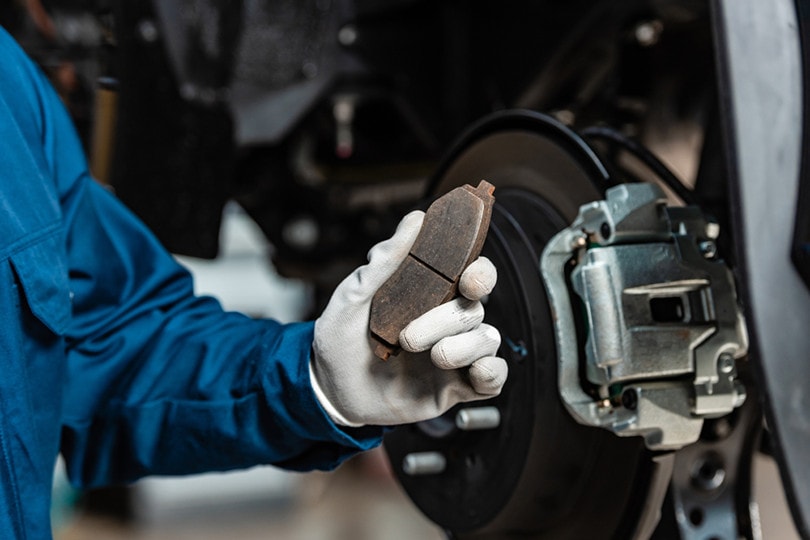
How Much Does It Cost to Get Calipers Replaced?
Luckily, calipers are not terribly expensive. You can purchase a caliper for around $100. However, because you usually have to replace two, you will need to pay at least $200 for the parts alone. That does not take into account the cost of labor required to put the calipers on.
Plus, when you replace the calipers, you may also find that you need to replace the brake pads or other parts. Therefore, while calipers are usually not terribly expensive, replacing them can get expensive pretty quickly.
Related Reads:
- What Is The Cost To Replace Brake Pads and Rotors? What You Need To Know!
- When to Replace Brake Rotors?
 Conclusion
Conclusion
Your car’s calipers will need to be replaced fairly regularly. Typically, calipers will hold up for about 7–10 years. However, if you drive over 75,000 miles before that, you may need to replace them sooner. You can also stay on the lookout for common signs that your calipers are failing, such as strange noises.
Caliper failure is not a laughing matter. It can be extremely serious. In the worst-case scenario, brakes can fail and cause accidents. Therefore, we highly recommend that you take any sign of caliper failure seriously and get them changed according to schedule.
While changing them can be expensive, this is not a part of car maintenance that you can gloss over.
Featured Image Credit: Ralphs_Fotos, Pixabay
Contents
